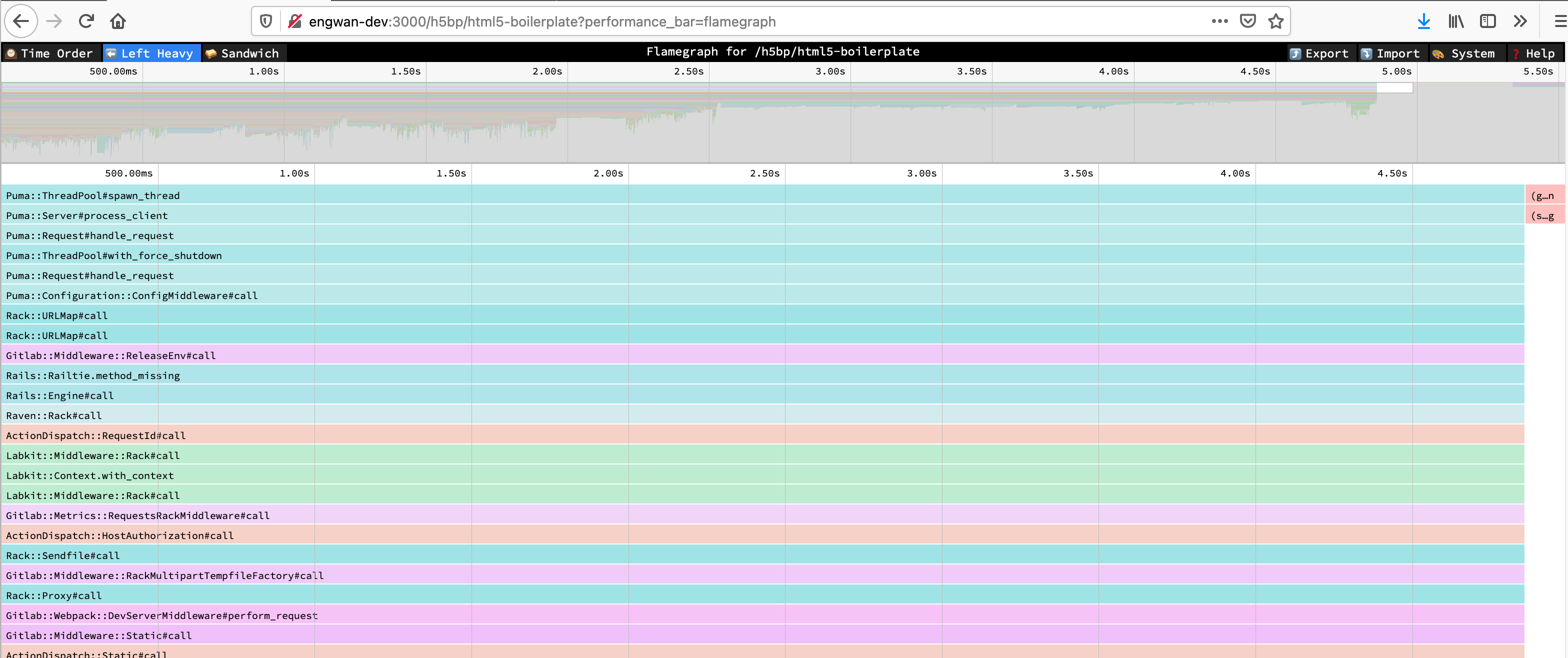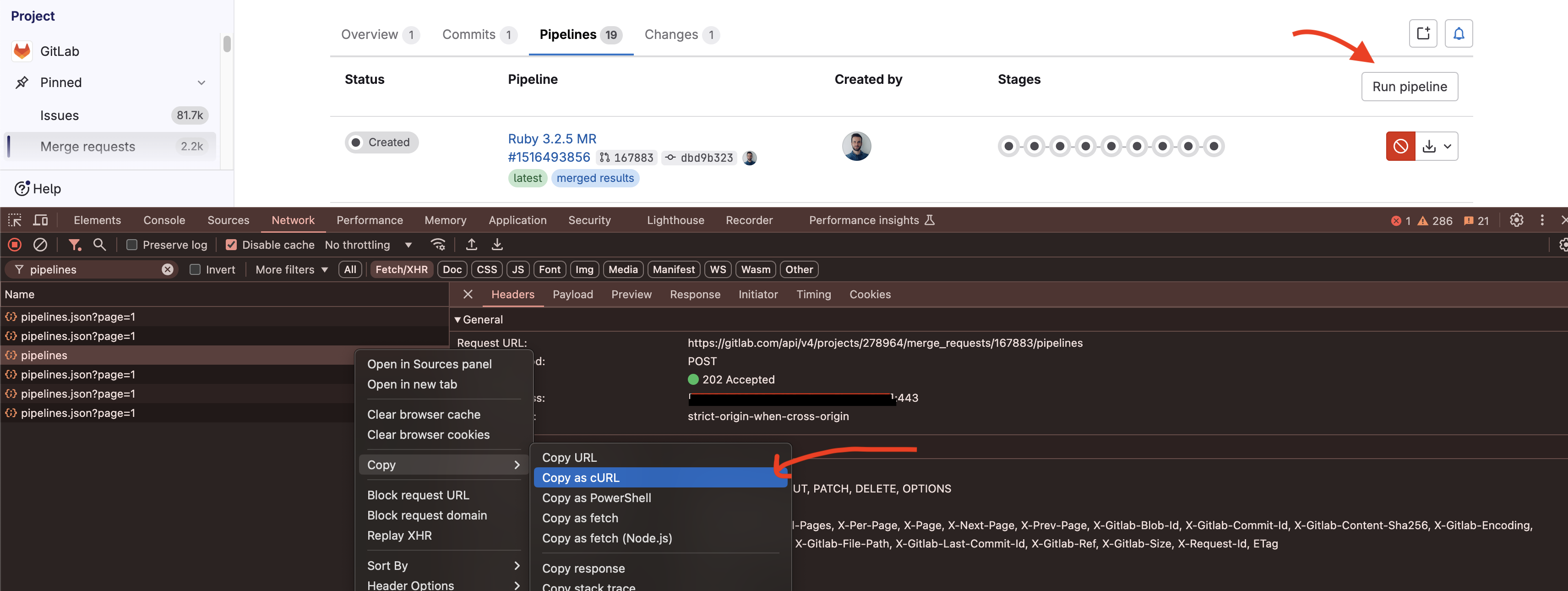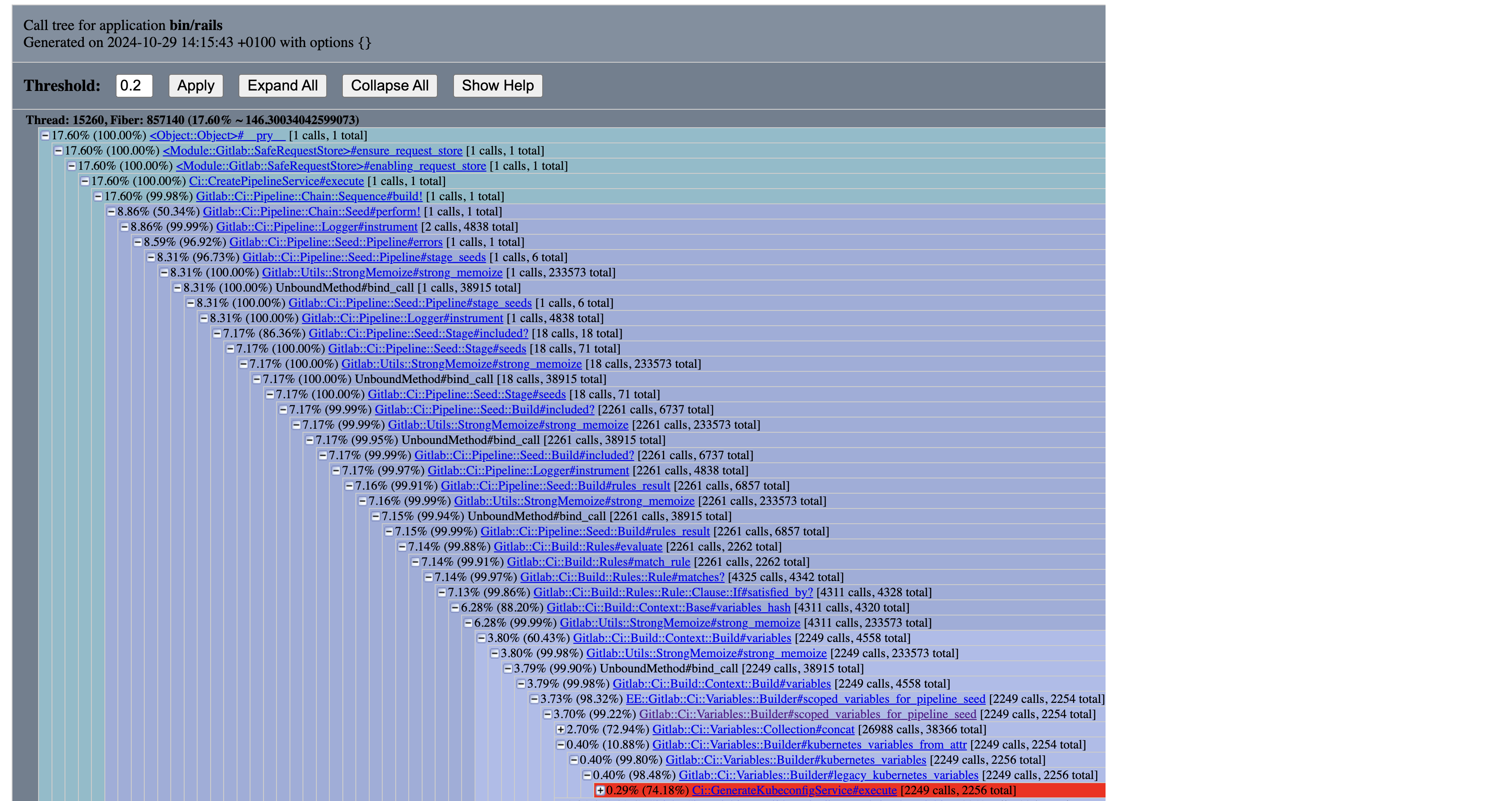Profiling
To make it easier to track down performance problems GitLab comes with a set of profiling tools, some of these are available by default while others need to be explicitly enabled.
Profiling a URL
There is a Gitlab::Profiler.profile method, and corresponding
bin/profile-url script, that enable profiling a GET or POST request to a
specific URL, either as an anonymous user (the default) or as a specific user.
The first argument to the profiler is either a full URL (including the instance hostname) or an absolute path, including the leading slash.
By default the report dump will be stored in a temporary file, which can be interacted with using the Stackprof API.
When using the script, command-line documentation is available by passing no arguments.
When using the method in an interactive console session, any changes to the application code within that console session is reflected in the profiler output.
For example:
Gitlab::Profiler.profile('/my-user')
# Returns the location of the temp file where the report dump is stored
class UsersController; def show; sleep 100; end; end
Gitlab::Profiler.profile('/my-user')
# Returns the location of the temp file where the report dump is stored
# where 100 seconds is spent in UsersController#showFor routes that require authorization you must provide a user to
Gitlab::Profiler. You can do this like so:
Gitlab::Profiler.profile('/gitlab-org/gitlab-test', user: User.first)Passing a logger: keyword argument to Gitlab::Profiler.profile sends
ActiveRecord and ActionController log output to that logger. Further options are
documented with the method source.
Gitlab::Profiler.profile('/gitlab-org/gitlab-test', user: User.first, logger: Logger.new($stdout))Pass in a profiler_options hash to configure the output file (out) of the sampling data. For example:
Gitlab::Profiler.profile('/gitlab-org/gitlab-test', user: User.first, profiler_options: { out: 'tmp/profile.dump' })
Reading a GitLab::Profiler report
You can get a summary of where time was spent by running Stackprof against the sampling data. For example:
stackprof tmp/profile.dumpExample sampling data:
==================================
Mode: wall(1000)
Samples: 8745 (6.92% miss rate)
GC: 1399 (16.00%)
==================================
TOTAL (pct) SAMPLES (pct) FRAME
1022 (11.7%) 1022 (11.7%) Sprockets::PathUtils#stat
957 (10.9%) 957 (10.9%) (marking)
493 (5.6%) 493 (5.6%) Sprockets::PathUtils#entries
576 (6.6%) 471 (5.4%) Mustermann::AST::Translator#decorator_for
439 (5.0%) 439 (5.0%) (sweeping)
630 (7.2%) 241 (2.8%) Sprockets::Cache::FileStore#get
208 (2.4%) 208 (2.4%) ActiveSupport::FileUpdateChecker#watched
206 (2.4%) 206 (2.4%) Digest::Instance#file
544 (6.2%) 176 (2.0%) Sprockets::Cache::FileStore#safe_open
176 (2.0%) 176 (2.0%) ActiveSupport::FileUpdateChecker#max_mtime
268 (3.1%) 147 (1.7%) ActiveRecord::ConnectionAdapters::PostgreSQLAdapter#exec_no_cache
140 (1.6%) 140 (1.6%) ActiveSupport::BacktraceCleaner#add_gem_filter
116 (1.3%) 116 (1.3%) Bootsnap::CompileCache::ISeq.storage_to_output
160 (1.8%) 113 (1.3%) Gem::Version#<=>
109 (1.2%) 109 (1.2%) block in <main>
108 (1.2%) 108 (1.2%) Gem::Version.new
131 (1.5%) 105 (1.2%) Sprockets::EncodingUtils#unmarshaled_deflated
1166 (13.3%) 82 (0.9%) Mustermann::RegexpBased#initialize
82 (0.9%) 78 (0.9%) FileUtils.touch
72 (0.8%) 72 (0.8%) Sprockets::Manifest.compile_match_filter
71 (0.8%) 70 (0.8%) Grape::Router#compile!
91 (1.0%) 65 (0.7%) ActiveRecord::ConnectionAdapters::PostgreSQL::DatabaseStatements#query
93 (1.1%) 64 (0.7%) ActionDispatch::Journey::Path::Pattern::AnchoredRegexp#accept
59 (0.7%) 59 (0.7%) Mustermann::AST::Translator.dispatch_table
62 (0.7%) 59 (0.7%) Rails::BacktraceCleaner#initialize
2492 (28.5%) 49 (0.6%) Sprockets::PathUtils#stat_directory
242 (2.8%) 49 (0.6%) Gitlab::Instrumentation::RedisBase.add_call_details
47 (0.5%) 47 (0.5%) URI::RFC2396_Parser#escape
46 (0.5%) 46 (0.5%) #<Class:0x00000001090c2e70>#__setobj__
44 (0.5%) 44 (0.5%) Sprockets::Base#normalize_logical_pathYou can also generate flamegraphs:
stackprof --d3-flamegraph tmp/profile.dump > flamegraph.htmlSee the Stackprof documentation for more details.
Speedscope flamegraphs
You can generate a flamegraph for a particular URL by selecting a flamegraph sampling mode button in the performance bar or by adding the performance_bar=flamegraph parameter to the request.
Find more information about the views in the Speedscope docs.
Find more information about different sampling modes in the Stackprof docs.
This is enabled for all users that can access the performance bar.
Bullet
Bullet is a Gem that can be used to track down N+1 query problems. It logs query problems to the Rails log and the browser console. The Bullet section is displayed on the performance bar.
Bullet is enabled only in development mode by default. However, logging is disabled, because Bullet logging is noisy. To configure Bullet and its logging:
-
To manually enable or disable Bullet on an environment, add these lines to
config/gitlab.yml, changing theenabledvalue as needed:bullet: enabled: false -
To enable Bullet logging, set the
ENABLE_BULLETenvironment variable to a non-empty value before starting GitLab:ENABLE_BULLET=true bundle exec rails s
As a follow-up to finding N+1 queries with Bullet, consider writing a
QueryRecoder test to prevent a regression.
System stats
During or after profiling, you may want to get detailed information about the Ruby virtual machine process, such as memory consumption, time spent on CPU, or garbage collector statistics. These are easy to produce individually through various tools, but for convenience, a summary endpoint has been added that exports this data as a JSON payload:
curl localhost:3000/-/metrics/system | jqExample output:
{
"version": "ruby 2.7.2p137 (2020-10-01 revision a8323b79eb) [x86_64-linux-gnu]",
"gc_stat": {
"count": 118,
"heap_allocated_pages": 11503,
"heap_sorted_length": 11503,
"heap_allocatable_pages": 0,
"heap_available_slots": 4688580,
"heap_live_slots": 3451712,
"heap_free_slots": 1236868,
"heap_final_slots": 0,
"heap_marked_slots": 3451450,
"heap_eden_pages": 11503,
"heap_tomb_pages": 0,
"total_allocated_pages": 11503,
"total_freed_pages": 0,
"total_allocated_objects": 32679478,
"total_freed_objects": 29227766,
"malloc_increase_bytes": 84760,
"malloc_increase_bytes_limit": 32883343,
"minor_gc_count": 88,
"major_gc_count": 30,
"compact_count": 0,
"remembered_wb_unprotected_objects": 114228,
"remembered_wb_unprotected_objects_limit": 228456,
"old_objects": 3185330,
"old_objects_limit": 6370660,
"oldmalloc_increase_bytes": 21838024,
"oldmalloc_increase_bytes_limit": 119181499
},
"memory_rss": 1326501888,
"memory_uss": 1048563712,
"memory_pss": 1139554304,
"time_cputime": 82.885264633,
"time_realtime": 1610459445.5579069,
"time_monotonic": 24001.23145713,
"worker_id": "puma_0"
}NOTE: This endpoint is only available for Rails web workers. Sidekiq workers cannot be inspected this way.
Settings that impact performance
Application settings
-
developmentenvironment by default works with hot-reloading enabled, this makes Rails to check file changes every request, and create a potential contention lock, as hot reload is single threaded. -
developmentenvironment can load code lazily once the request is fired which results in first request to always be slow.
To disable those features for profiling/benchmarking set the RAILS_PROFILE environment variable to true before starting GitLab. For example when using GDK:
- create a file
env.runitin the root GDK directory - add
export RAILS_PROFILE=trueto yourenv.runitfile - restart GDK with
gdk restart
This environment variable is only applicable for the development mode.
GC settings
Ruby's garbage collector (GC) can be tuned via a variety of environment variables that will directly impact application performance.
The following table lists these variables along with their default values.
| Environment variable | Default value |
|---|---|
RUBY_GC_HEAP_INIT_SLOTS |
10000 |
RUBY_GC_HEAP_FREE_SLOTS |
4096 |
RUBY_GC_HEAP_FREE_SLOTS_MIN_RATIO |
0.20 |
RUBY_GC_HEAP_FREE_SLOTS_GOAL_RATIO |
0.40 |
RUBY_GC_HEAP_FREE_SLOTS_MAX_RATIO |
0.65 |
RUBY_GC_HEAP_GROWTH_FACTOR |
1.8 |
RUBY_GC_HEAP_GROWTH_MAX_SLOTS |
0 (disable) |
RUBY_GC_HEAP_OLDOBJECT_LIMIT_FACTOR |
2.0 |
RUBY_GC_MALLOC_LIMIT(_MIN) |
(16 * 1024 * 1024 /* 16MB */) |
RUBY_GC_MALLOC_LIMIT_MAX |
(32 * 1024 * 1024 /* 32MB */) |
RUBY_GC_MALLOC_LIMIT_GROWTH_FACTOR |
1.4 |
RUBY_GC_OLDMALLOC_LIMIT(_MIN) |
(16 * 1024 * 1024 /* 16MB */) |
RUBY_GC_OLDMALLOC_LIMIT_MAX |
(128 * 1024 * 1024 /* 128MB */) |
RUBY_GC_OLDMALLOC_LIMIT_GROWTH_FACTOR |
1.2 |
(Source)
GitLab may decide to change these settings to speed up application performance, lower memory requirements, or both.
You can see how each of these settings affect GC performance, memory use and application start-up time for an idle instance of
GitLab by running the scripts/perf/gc/collect_gc_stats.rb script. It will output GC stats and general timing data to standard
out as CSV.
An example of investigating performance issues
The Pipeline Authoring team has worked on solving the pipeline creation performance issues
and used both the existing profiling methods such as stackprof flamegraphs and memory_profiler
and a new method ruby-prof.
Using stackprof flamegraphs
Performance bar is a great tool to get a stackprof report and see a flamegraph via a single click;
However, it's not available for other than GET requests.
To get a flamegraph for a POST request, we use the performance_bar=flamegraph parameter with the API request.
In our case, we want to see the flamegraph for the pipeline creation endpoint of a merge request.
Normally, we could use the following command to get a stackprof report as a JSON file but our user control
of Gitlab::PerformanceBar.allowed_for_user?(request.env['warden']&.user) allows only users authenticated via the web interface.
# This will not work on production
curl --request POST \
--output flamegraph.json \
--header 'Content-Type: application/json' \
--header 'PRIVATE-TOKEN: :token' \
"https://gitlab.example.com/api/v4/projects/:id/merge_requests/:iid/pipelines?performance_bar=flamegraph"To get around this, we copy the request as curl and use it in the terminal.
We'll have a curl command like this:
curl "https://gitlab.com/api/v4/projects/:id/merge_requests/:iid/pipelines" \
-H 'accept: application/json, text/plain, */*' \
-H 'content-type: application/json' \
-H 'cookie: xyz' \
-H 'x-csrf-token: xyz' \
--data-raw '{"async":true}'- Notice the
asyncparameter in the request body. We need to remove it to get the actual performance of the pipeline creation endpoint. - We need to add the
performance_bar=flamegraphparameter to the request. - We need to add the
--output flamegraph.jsonparameter to save the JSON response to a file. - Lastly, we need to accept the JSON response only.
curl "https://gitlab.com/api/v4/projects/:id/merge_requests/:iid/pipelines?performance_bar=flamegraph" \
-X POST \
-o flamegraph.json \
-H 'accept: application/json' \
-H 'content-type: application/json' \
-H 'cookie: xyz' \
-H 'x-csrf-token: xyz'Then, we use the flamegraph.json file on the https://www.speedscope.app/ website to see the flamegraph.
As an example, when investigating into this speedscope flamegraph, we saw that the kubernetes_variables method was
taking a lot of time and created an issue.
Using ruby-prof
Another method to see where to spend most of the time is to use ruby-prof.
It's not an included gem in the Gemfile, so we need to add it to the Gemfile and run bundle install first.
To investigate the problem, we need to have a replica repository. To do this, we could mirror the repository
from the production instance to the development instance. Then, we can run the ruby-prof profiler to see where
the time is spent.
# RAILS_PROFILE=true GITALY_DISABLE_REQUEST_LIMITS=true rails console
require 'ruby-prof'
ActiveRecord::Base.logger = nil
project = Project.find_by_full_path('root/gitlab-mirror')
user = project.first_owner
merge_request = project.merge_requests.find_by_iid(1)
profile = RubyProf::Profile.new
profile.exclude_common_methods! # see https://github.com/ruby-prof/ruby-prof/blob/1.7.0/lib/ruby-prof/exclude_common_methods.rb
profile.start
Gitlab::SafeRequestStore.ensure_request_store do
Ci::CreatePipelineService
.new(project, user, ref: merge_request.source_branch)
.execute(:merge_request_event, merge_request: merge_request)
.payload
end; nil
result = profile.stop
callstack_printer = RubyProf::CallStackPrinter.new(result)
File.open('tmp/ruby-prof-callstack-report.html', 'w') do |file|
callstack_printer.print(file)
end
::Ci::DestroyPipelineService.new(project, user).execute(Ci::Pipeline.last)Here, we can see that we call Ci::GenerateKubeconfigService ~2k times.
This is a good indicator that we need to investigate this.
Using memory_profiler
memory_profiler is a tool to profile memory usage.
This is also important because high memory usage can lead to performance issues.
As we did with stackprof, we could also use curl with the performance_bar parameter.
curl "https://gitlab.com/api/v4/projects/:id/merge_requests/:iid/pipelines?performance_bar=memory" \
-X POST \
-o flamegraph.json \
-H 'accept: application/json' \
-H 'content-type: application/json' \
-H 'cookie: xyz' \
-H 'x-csrf-token: xyz'However, this will not work on production because we have 60-second timeouts for the requests. So, we need to use the development environment to get the memory profile. More information can be found in the memory profiler documentation.
# RAILS_PROFILE=true GITALY_DISABLE_REQUEST_LIMITS=true rails console
require 'memory_profiler'
ActiveRecord::Base.logger = nil
project = Project.find_by_full_path('root/gitlab-mirror')
user = project.first_owner
merge_request = project.merge_requests.find_by_iid(1)
# Warmup
Ci::CreatePipelineService
.new(project, user, ref: merge_request.source_branch)
.execute(:merge_request_event, merge_request: merge_request); nil
report = MemoryProfiler.report do
Gitlab::SafeRequestStore.ensure_request_store do
Ci::CreatePipelineService
.new(project, user, ref: merge_request.source_branch)
.execute(:merge_request_event, merge_request: merge_request); nil
end
end; nil
output = File.open('tmp/memory-profile-report.txt', 'w')
report.pretty_print(output, detailed_report: true, scale_bytes: true, normalize_paths: true)Result;
#
# Note: I redacted some parts related to the gems and the Rails framework.
# also, the output is shortened for readability.
#
Total allocated: 1.30 GB (12974240 objects)
Total retained: 29.67 MB (335085 objects)
allocated memory by gem
-----------------------------------
675.48 MB gitlab/lib
...
allocated memory by file
-----------------------------------
253.68 MB gitlab/lib/gitlab/ci/variables/collection/item.rb
143.58 MB gitlab/lib/gitlab/ci/variables/collection.rb
51.66 MB gitlab/lib/gitlab/config/entry/configurable.rb
20.89 MB gitlab/lib/gitlab/ci/pipeline/expression/lexeme/base.rb
...
allocated memory by location
-----------------------------------
107.12 MB gitlab/lib/gitlab/ci/variables/collection/item.rb:64
70.22 MB gitlab/lib/gitlab/ci/variables/collection.rb:28
57.66 MB gitlab/lib/gitlab/ci/variables/collection.rb:82
45.70 MB gitlab/lib/gitlab/config/entry/configurable.rb:67
42.35 MB gitlab/lib/gitlab/ci/variables/collection/item.rb:17
42.35 MB gitlab/lib/gitlab/ci/variables/collection/item.rb:80
41.32 MB gitlab/lib/gitlab/ci/variables/collection/item.rb:76
20.10 MB gitlab/lib/gitlab/ci/variables/collection/item.rb:72
...In this example, we see where we can optimize the memory usage by looking at the allocated memory by file and location.
And in a recent work, we found a way to improve the memory usage and got this result;
#
# Note: I redacted some parts related to the gems and the Rails framework.
# also, the output is shortened for readability.
#
Total allocated: 1.08 GB (11171148 objects)
Total retained: 29.67 MB (335082 objects)
allocated memory by gem
-----------------------------------
495.88 MB gitlab/lib
...
allocated memory by file
-----------------------------------
112.44 MB gitlab/lib/gitlab/ci/variables/collection.rb
105.24 MB gitlab/lib/gitlab/ci/variables/collection/item.rb
51.66 MB gitlab/lib/gitlab/config/entry/configurable.rb
20.89 MB gitlab/lib/gitlab/ci/pipeline/expression/lexeme/base.rb
...Total memory reduction for this example pipeline; ~200 MB.






